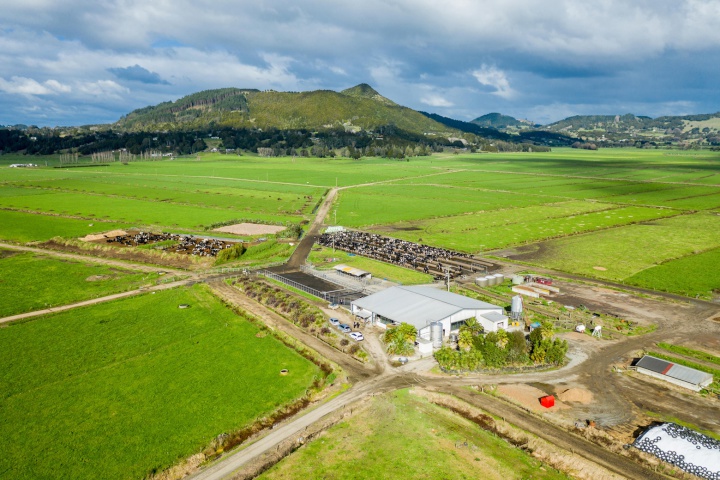Substantial dairy farm for sale
Substantial dairy farm with extensive building
infrastructure placed on the market for sale
A Northland dairy farm operating one of the biggest milking sheds in the province – consequently producing one of the highest milk output tallies for the region’s dairy sector – has been placed on the market for sale.

The 538.6-hectare farm at Kauri some 13-kilometres north of Whangarei has been milking a herd of 1050 cows – producing 499,632 kilogrammes of milk solids in the 2011/18 season and with a forecast to produce 500,000 kilogrammes of milk solids in the current 2019/2020 season. Kauri Farm’s milk supply is contracted to Fonterra.
The property consists of some 200 flat contoured paddocks – the majority of which are in rye/clover pasture growing on loamy peat soil. The paddocks run off a well-developed 20-kilometres stock race network connecting the milking shed with the peripheries of the property and allowing for double entry points to most paddocks. All fencing across the property is electric.
Now the freehold property at Apotu Road in Kauri is being marketed for sale by tender through Bayleys Whangarei, with tenders closing at 2pm on November 28. Salespeople Tracy Dalzell and Lin Norris said the oblong-shaped property had three vehicular access points – one of Apotu Road, and two off Crane Road.
“Water is drawn from a spring via an easement and then gravity fed to a pair of 25,000 litre storage tanks before being pumped to paddocks and the milking shed,” Ms Dalzell said.
“Effluent from the dairy shed and the feed pads flows directly into a 175,000 litre holding tank and is either pumped directly onto pasture via travelling irrigator or to a separate 90 day storage facility where it is irrigated on to pasture.”
“Various supplementary feeds are brought onto Kauri Farms annually – encompassing between 800 – 1,200 tonnes of palm kernel, 200 tonnes of corn gluten feed, and 100 tonnes of molasses. Kauri Farm’s extensive feed pads and in-shed feed system allow for flexibility and the ability to change feed intakes as required.
“This is in addition to up to 1,300 tonnes of maize grown on the farm annually, with further summer feed coming from grass silage harvested off 60 hectares of dedicated pasture,” she said.
Farm building
infrastructure on the Kauri property consists of:
• A
semi-automated 80-bail rotary milking shed with modern milk
cooling system and tanks installed in 2012, three-way
drafting system, and in-shed feeding line
• Two feed
pads with a combined capacity of sustaining 550
animals
• A dedicated calf-rearing facility capable of
accommodating up to 180 calves under cover
• A six-bay
implement shed and a separate new four-bay implement
shed
• A trio of half-round barns used for both feed,
stock, and equipment storage
and
• Various
fertiliser bins and silos.
Mr Norris said that the sizable 80-bail milking shed and adjoining extensive concrete pad areas meant Kauri Farms was one of the biggest milk-producing farms in Northland – capable of servicing multiple herds. The farm is operated by five full-time staff, with additional workers brought in during calving season and winters up to 1100 cows.
Supporting Kauri
Farm’s output, the various residential dwellings on the
property consist of:
• A two-storey
four-bedroom/two-bathroom main homestead with a flat lawn
area to the front and mature bush to the rear
• A
three-bedroom manager’s home with its own self-contained
studio unit
and
• A pair of single-bedroom
worker’s units built side by side in 2007.
Mr Norris
said the quality of Kauri Farms’ kikuyu-free pasture was
the resulting combination of fertile soils, and a
maize/pasture rotation policy was operated an extensive
pasture renewal fertilisation programme through the annual
application of nitrogen, phosphorus, potassium, sulphur,
magnesium and
calcium.


 Gordon Campbell: On Surviving Trump’s Trip To La La Land
Gordon Campbell: On Surviving Trump’s Trip To La La Land NZCTU: Unions Launch Petition To Protect Pay Equity
NZCTU: Unions Launch Petition To Protect Pay Equity Greenpeace: Greenpeace Slams PM’s Science Pick - 'Polluters Are Running The Show'
Greenpeace: Greenpeace Slams PM’s Science Pick - 'Polluters Are Running The Show' NZ Government: PM’s Science Prizes Celebrate Excellence
NZ Government: PM’s Science Prizes Celebrate Excellence Department of Conservation: Pinnacles Hut, Summit Track Set For Improvement
Department of Conservation: Pinnacles Hut, Summit Track Set For Improvement  Tax Justice Aotearoa: New Report Illustrates Tax System Failures
Tax Justice Aotearoa: New Report Illustrates Tax System Failures PSA: PSA Welcomes Increased Defence Spend On Civilian Salaries
PSA: PSA Welcomes Increased Defence Spend On Civilian Salaries


